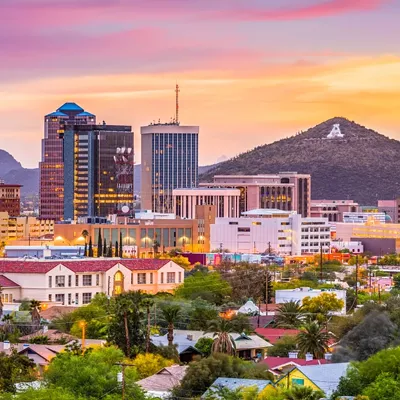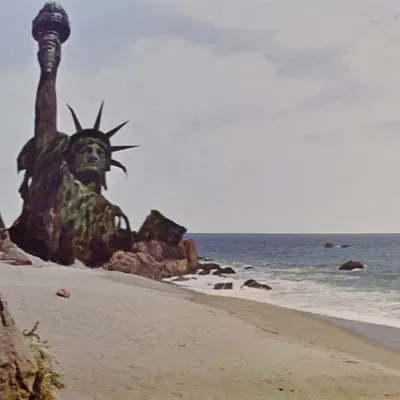What is new, however, is that someone has finally quantified this grim epoch of abuse.
On Oct. 22, U.S. Rep. Raúl Grijalva released a report, compiled by his staff and subtly titled, "The Bush Administration Assaults on Our National Parks, Forests and Public Lands (A Partial List)."
"We put this report out both as an indictment and as a blueprint," Grijalva told a small group gathered in his Tucson office for the release. "And we hope it's received that way."
The tone is set by the report's introduction. Grijalva chairs the National Parks, Forests and Public Lands Subcommittee, and he recently sponsored a successful resolution to temporarily close an area near Grand Canyon National Park to uranium mining. This moratorium would give Congress time to decide whether permanent protection for those lands is warranted.
The administration's response? First, it ignored the resolution and allowed uranium companies to keep mining. Then it attempted to permanently yank the longtime congressional authority to make such a stopgap closure. "It's an assault on the inherent authority of Congress," Grijalva said, "when you strip that power away."
He calls it part of a comprehensive Bush administration strategy to turn public lands into resource commodities. "There is an agenda," he says. "This report is to point out what that agenda is, and how we begin the process of undoing it."
Grijalva said he expects a slew of last-ditch efforts to gut environmental regulations in the administration's final days.
It would be a fitting end for a presidency during which people have often been plucked straight from resource industries and put in charge of public lands. Career professionals "have been replaced by political appointments that come with very strict agendas," said Grijalva, "and that's how they run the agencies and the sub-agencies.
"We've had executive orders. We've had regulatory rollbacks. We've had manipulation of science. Scientifically based decisions are sometimes difficult, politically, but they're usually based in fact. And to manipulate that is a horrible thing. That's why we wanted to get this report out. We've distributed it to our colleagues, to major media."
Part of the purpose, he said, is to prod the next administration to follow a much more progressive track. "We'd like to see them change the culture of public-lands administration, to return the use of science and professionalism. And quite frankly, (to use the report) as a guide for who to appoint to the very, very important position of secretary of interior. What will be that philosophy? And from that, what are the other consequential political appointments that will happen?"
The report cites a shameful roster of attacks on conservation, from those efforts to weaken air-quality standards and the ongoing uranium mining next to the Grand Canyon, to the wholesale slaughter of buffalo in Yellowstone National Park at the behest of area ranchers.
But other measures are even more insidious. For example, the report cites attempts by Bush appointees to outsource thousands of Park Service jobs to private contractors, and the use of a political litmus test for civil-service managers. The administration has also attempted to rewrite the agency's mission, upending the traditional priority of conservation and replacing it with an emphasis on visitor services. Meanwhile, agency managers have moved their parks toward more commercialization and played shell games with budgets.
Similar misconduct is occurring at the Bureau of Land Management. It includes streamlining gas and oil development on BLM lands; making the cleanup of contaminated sites by companies purely voluntary; allowing off-road vehicles to decimate public lands; attempting to relinquish control of much of those lands to the states; and prohibiting the designation of any new wilderness areas.
The situation is equally troubling within the Forest Service, where regulatory changes have thwarted proper forest planning. In addition, the agency has also adopted the widespread use of what are called "categorical exclusions." As their name implies, these handy administrative tools contain categories of projects that may be excluded from the full reviews otherwise required by the National Environmental Policy Act. While initially created to reduce paperwork for routine maintenance and other low-impact work on federal lands, the exclusions are now being used for a growing variety of projects.
For examples, look no further than our own Coronado National Forest. Recently, former Santa Catalina District Ranger Larry Raley sparked a controversy by invoking an exclusion to approve road reconstruction in flood-damaged Sabino Canyon. And last year, then-Sierra Vista District Ranger Doug Hardy used categorical exclusions while approving four mining-exploration permits near Patagonia.
According to Grijalva, the Bush administration has also displayed blatant disregard for conservation along the U.S.-Mexico border. This is largely driven by remarkable powers invested in the U.S. Department of Homeland Security. Grijalva's report takes particular aim at the REAL ID Act of 2005, which allows the department to override all environmental laws when installing fences and other security measures along the borderline. Not surprisingly, this power has been repeatedly abused, perhaps no more egregiously than in the construction of a fence across Southern Arizona's environmentally sensitive San Pedro River. Many scientists believe the barrier will have devastating long-term effects on the ecologically vital waterway.
So how does this dismal list get addressed? Grijalva said that hope for change lies in the next administration and a Congress more willing to challenge this systematic disassembling of our land-management agencies and environmental protections. He added that he and his congressional colleagues failed to capitalize on the public's unhappiness with the anti-environmental politics of President Bush. "I don't think we utilized public opinion, and organizational support as well, to move our agenda."
Still, with the exception of energy issues, the environment has received little attention from either presidential candidate. That's a sign of the chore Grijalva and others face in keeping conservation issues on the national radar.
"The next Congress is going to be facing all these economic questions," he said. "But at the same time, we don't want the issue of our environment, the issue of our public lands ... to be lost in that struggle."










